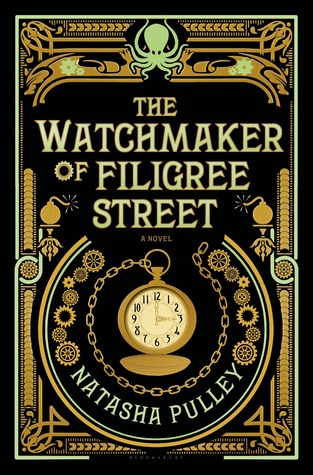
Oh boy, where do I begin with this?
I loved Natasha Pulley’s second book, The Bedlam Stacks, it had a well-developed and interesting plot with characters that I, for the most part, liked. The Bedlam Stacks could be read as queer, and I definitely interpreted it that way, but whether there truly is a romance or not is never actually stated within the pages of the book. I knew that The Watchmaker of Filigree Street on the other hand did have an actual M/M romance, so I was excited to dive in.
The Watchmaker of Filigree Street follows Thaniel, a telegraph clerk for the British Government. On his birthday, Thaniel finds a mysterious pocket watch on his pillow. Six months later the watch saves his life, blaring an alarm only minutes before a bomb destroys Scotland Yard. Thaniel seeks out the watchmaker, Keita Mori, for answers, but only comes away with more questions. Could Mori be involved in the plan to bomb Scotland Yard? And if so, why did he save Thaniel?
What starts out as a promising mystery fades to the background of a story that I found to lack cohesiveness and consistency. I loved the slow burn romance. So slow burn that it sparked a whole debate on Goodreads with people surprised by Thaniel and Mori’s romantic climax. However, that is pretty much all that enjoyed.
The Watchmaker of Filigree Street is a book that is trying to be too many things, while not really fulfilling any of them. I would call it a historical fantasy romance, leaning more in the way of a historical romance with small fantasy elements; However, the romance was relatively understated and was overwhelmed with a marriage of convenience plot that devolved into jealousy.
The story lacks a cohesiveness and consistency because it is trying to be too much. I felt like the plot would tie back into the original mystery thread when convenient, but not consistently. I found the inconsistency to be particularly frustrating because many of the side plots were not very interesting and followed characters I really disliked.
For me, the worst part of the plot problem was the climax. The climax doesn’t tie into the bomb plotline that starts everything in any meaningful way. I thought that the climax was going to be a turning point for Grace (a character who I will go into more detail about shortly) that would make her into a proper antagonist for the story; that her plan would use the fact that Mori was a suspect in the Scotland Yard bombing. But the climax doesn’t tie in like that, and Grace doesn’t change and fails for me as a character. I really want to expound on this point, but I can’t without too many spoilers.
I
will say, however, that if another side character, Yuki, had carried out Grace’s
plot during the climax, most of the plotlines would have tied together very
cleanly and there wouldn’t have been so much wasted potential.
Onto Grace. I don’t
know why Grace was a POV character. Her characterization was a mess. She’s not
like other girlsTM . Other girls are vapid, and study literature in
college, and should never get the right to vote because they would go to war
over someone looking at them wrong; whereas, she’s smart, and does physics, and
has short hair, and sneaks into the
library unaccompanied by dressing like a man.
Grace does not progress through a character arc and grow as a character; instead, she took on traits that were at odds with her prior characterization with no explanation. As we neared the climax, I thought that she was going to become a proper antagonist in the story, but instead her master plan is self-centred and doesn’t serve the purpose she intended.
Maybe Grace is supposed to be a barrier in Thaniel and Mori’s relationship to bring in more external conflict, but I don’t feel like that was particularly believable in the writing. She and Thaniel choose to get married as, essentially, a business arrangement, but suddenly she gets jealous about how much time Thaniel and Mori spend together, and constantly tries to drive them apart. It felt overly derived and at odds with Grace’s independence and supposedly logical existence.
Oh, and get ready for all of the historical racism. It gets exhausting to read the words “dirty chinamen” more than once. I feel like there are better ways to address racism in historical fiction than to constantly have slurs thrown around, especially when the work of fiction is written by a white woman.
Despite all of this, I still pre-ordered (and then was later approved for an ARC) of the direct sequel to The Watchmaker of Filigree Street. I’m hoping that without Grace in the story, I can enjoy the next book more. Next week, we will find out if I made the right choice.
